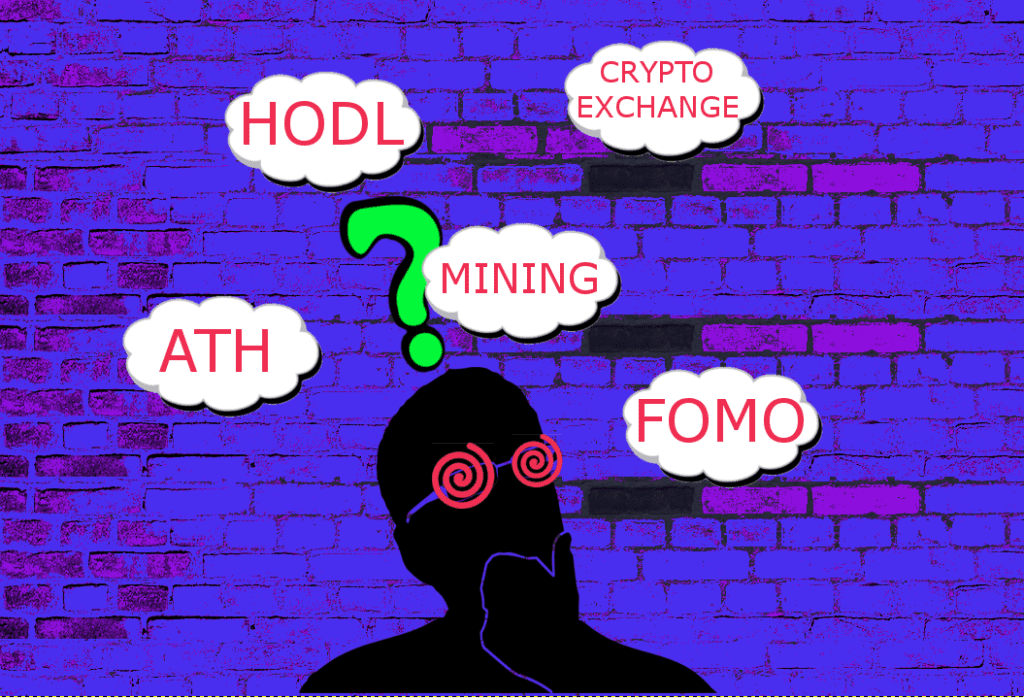
With the recent boom in the popularity of cryptocurrencies, a lot of new terminology has become mainstream for cryptocurrency users. “ATH Crypto FOMO”…huh, what does that mean? If you’re feeling lost, don’t worry! This article will explain some of the most popular cryptocurrency terms. By the end, you’ll be a lot more knowledgeable about cryptocurrency.
What Are Cryptocurrencies?
Also referred to as “crypto.” Cryptocurrencies, or digital currencies, are electronic assets intended to be used as a medium of exchange. Cryptocurrencies have no physical form and exist entirely in the virtual world. Bitcoin was the first cryptocurrency.
What Are Altcoins?
Altcoins are any cryptocurrency that isn’t Bitcoin. Most altcoins are based on the same code as Bitcoin but with slight alterations. Examples of popular altcoins include Ethereum, Chainlink, Tether, and Cardano.
What is a Blockchain?
Blockchain is a public ledger that records every cryptocurrency transaction linearly and chronologically. Blockchain is beneficial for verifying and recording transactions without the need for a central authority. The decentralized nature of blockchain makes it practically impossible for anyone to alter the data.
What is a Smart Contract?
A smart contract is a computer program that allows us to exchange money or data transparently without third-party involvement. This blockchain technology is a self-executing contract with the terms of the agreement between buyer and seller being directly written into lines of code.
What is a Cryptocurrency Exchange?
A cryptocurrency exchange is an online platform where you can buy, sell, or trade cryptocurrencies. Cryptocurrency exchanges work similarly to traditional foreign exchanges (forex) where users can trade between currencies, from Bitcoin to Ethereum. However, unlike forex exchanges, cryptocurrencies can be traded 24/7.
What is an ICO?
An ICO (Initial Coin Offering) is a means of crowdfunding projects. A percentage of the newly issued cryptocurrency is sold to investors in exchange for legal tender or other cryptocurrencies. Startups often use ICOs to bypass the rigorous and regulated capital-raising process required by venture capitalists or banks.
What is a Token Sale?
A token sale is a way to fund the development of a new cryptocurrency startup. Token sales are often open to everyone and raise money from a wide range of participants.
What is a Wallet?
In cryptocurrency networks, wallets are used to send and receive transactions. Wallet safety is essential as it stores sensitive data like private keys. A wallet is more secure if it is offline and in cold storage.
What is Cold Storage and Hot Storage?
Cold storage refers to keeping cryptocurrency offline in a secure wallet such as a Ledger wallet. Hot storage refers to keeping cryptocurrency online in a digital wallet such as MetaMask.
What is the Difference Between a Hard Fork and a Soft Fork?
A hard fork refers to an extreme change to the protocols of a blockchain network. When a hard fork occurs, the code changes so much that the new version is no longer backward-compatible with the earlier code. A soft fork, in comparison, means only minor changes are made. The changes are backward-compatible with the earlier code.
What is Mining?
Mining is the process by which new cryptocurrency tokens are created. Mining is usually done by specialized computers and takes a lot of electricity. Miners get rewarded with cryptocurrency for mining blocks.
What is a Mining Pool?
Mining pools are groups of miners who combine their computing power. Mining pools are usually used to mine the most profitable cryptocurrency coins. Mining pools are a great way to start mining as they are easy to set up and run.
What is Proof of Work and Proof of Stake?
Proof of Work (PoW) is the term used to describe the process of mining cryptocurrency. It is a required step in verifying transactions on the blockchain and is the mechanism cryptocurrency uses to reach a consensus on which transaction came first. PoW is the most energy-intensive part of the mining process.
Proof of Stake (PoS) validators lock up set amounts of cryptocurrency in a smart contract on the blockchain. In exchange, they get a chance to validate new transactions and earn a reward. It is an alternative to PoW that reduces energy consumption and eliminates the need for specialized hardware.
What are Smart Contracts?
Smart contracts are computer protocols that facilitate, verify, or enforce the negotiation or performance of a contract. They can be coded to execute automatically when certain conditions are met. Smart contracts allow for the automation of transactions and agreements in a transparent, secure, and inexpensive way.
What is Farming?
Farming is the term used to describe the process of “mining” or creating new cryptocurrencies. Farming can be done on a local computer or through a cloud service.
What is Play-to-Earn?
Play-to-earn is a type of game that rewards the player based on their skill level or progress. The player earns more by playing better, not by paying more. Play-to-earn games reward players with virtual currency that can be exchanged for real-world goods or services.
What is an NFT?
Non-fungible token (NFT) is a unique digital asset that can be collected, stored, or traded. NFTs are usually game assets, also known as in-game items.
What is an Airdrop?
An Airdrop is a distribution of digital tokens or coins to a community. This is usually done to build project awareness and increase the number of users or active participants.
What Are Meme Coins and Stable Coins?
Meme coins are cryptocurrencies created as a joke and whose value is often based on internet memes. For example, Pepe Cash is a meme coin based on the popular meme character Pepe the Frog.
Stablecoins are meant to have a value similar to a fiat currency. An example of a stablecoin is DAI, which is pegged to the value of $1 USD.
What Are Gas Fees?
Gas fees are fees you pay to networks when you send a transaction. They are not paid to any other party, but they will be taken from what you have sent in the transaction. Gas fees are calculated based on how much data your transaction uses.
What is KYC?
KYC stands for Know Your Customer. KYC is a process in which a business verifies the identity of its clients. The process is used in the financial, public, and many other industries to prevent money laundering, fraud, and terrorist financing.
What is a DAO?
A DAO stands for Decentralized Autonomous Organization. It is a collection of individuals with no central authority. DAOs are governed by smart contracts and run as programmed without any possibility of downtime, censorship, fraud, or third-party interference.
What Are Coins and Tokens?
Coins are cryptocurrencies that function as a currency. Bitcoin is an example of a coin. Tokens are cryptocurrencies that can represent a specific asset or utility. XRP is an example of a token. Many coins also act as a token and vice versa.
What Are Other Popular Terms You Should Know?
HODL – Hold On for Dear Life. It refers to holding onto your coins even in really bad market conditions where the value of your cryptocurrency coins/tokens have gone down by large percentages. This misspelling of “Hold” became popularized in the Bitcoin community because people believed it was a good idea to hold onto their coins instead of selling them when prices were decreasing. The term has since been adapted and used for all cryptocurrencies.
ATH – All Time High. This is the highest price any coin has ever reached.
FOMO – Fear of Missing Out. This is a common feeling when someone sees a coin jumping from a few dollars to $500 in an hour.
DYOR – Do Your Own Research. This is a common response to someone who asks if they should invest in a particular coin. The implication is that they should research and not rely on someone else’s words.
FUD – Fear, Uncertainty, and Doubt. This is often used in the crypto world to describe someone who speaks negatively about a particular coin.
TA – Technical Analysis. This refers to looking at charts and graphs to see where a coin is headed next.
Conclusion
In the fast-paced world of cryptocurrencies, where ATH Crypto FOMO can lead to both exhilarating highs and nerve-wracking lows, this article has equipped you with the essential knowledge to confidently navigate this dynamic landscape. From understanding the fundamentals of blockchain technology to grasping the intricacies of smart contracts and wallet security, you’re well-prepared to make informed decisions in the face of ATH Crypto FOMO. As you continue your crypto journey, remember the importance of DYOR and stay vigilant, for knowledge is your strongest ally in this ever-evolving realm.
Click here to learn about 5 low cap altcoins ready for explosive growth.
Recent Posts
Top Indicators to Determine the Start of the Crypto Bull Market
In the world of cryptocurrencies, figuring out when the bear market is over isn't straightforward. It's like piecing together a puzzle using different signs and factors. No single thing can outright...
Binance Vs. Coinbase: Comparing Fees, Security, and Ease of Use
Binance and Coinbase are two of the largest and most popular cryptocurrency exchanges in the world. They both offer a wide range of features and services, but they also have some key differences. In...

